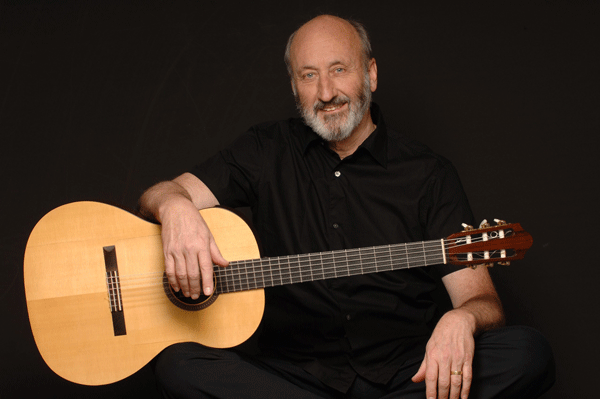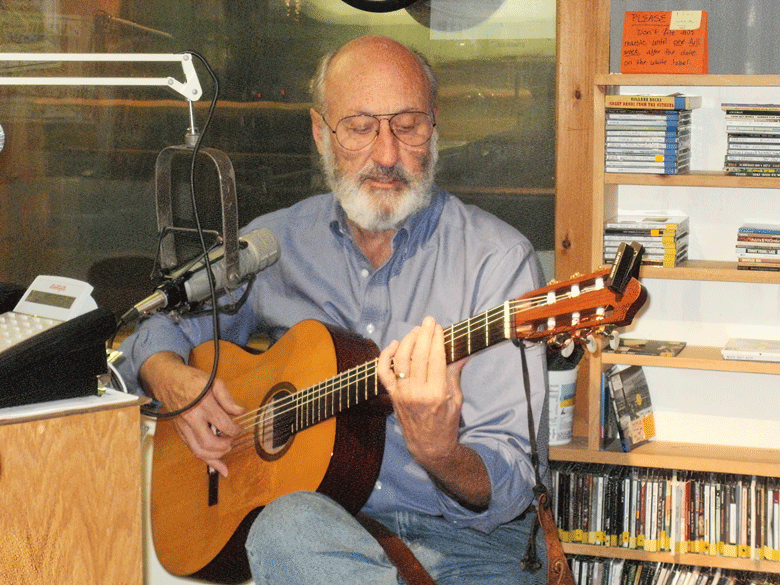His given name is Noel, but most over the age of 60 know him as Paul Stookey, a member of the folk music trio Peter, Paul, and Mary, stalwarts of the 1960s, known for covering such songs as “Blowin’ in the Wind” by a then-unknown Bob Dylan, Pete Seeger and Lee Hays’ “If I Had a Hammer,” and of course, “Puff the Magic Dragon.”
Stookey continued to make music with and without his former bandmates, and even at age 84, has released a new album, Fazz: Now & Then, a collection that infuses jazz chords and a beat sensibility to his folk roots. Or maybe the other way around.
Stookey hails from rural Maryland, but in the early 1970s, he chose to settle in coastal Maine, where he and his wife raised three daughters in Blue Hill Falls, a few miles from where E.B. White lived and wrote. He cites the landmark how-to, Living The Good Life, by Scott and Helen Nearing, who later lived in Brooksville, as influencing his search for a rural life. He also espouses Christian beliefs, which has threaded through his music.
Our conversation over Zoom, with Stookey in his Blue Hill home, was edited for length and clarity.

The Working Waterfront: How did you come to live in Maine?
Noel Stookey: We bought a house in New Hampshire, and actually spent about three months there, and just decided that it was too insular. We were fortunate enough to be able to afford to experiment with actual purchases. I think we were still living in Westchester County (N.Y.) at that point. This would have been the early ‘70s.
I had just—what we referred to in Peter, Paul, and Mary as “taking time off for good behavior”—I had just gone through such a spiritual change that the only way I could see discovering and defining the clarity of that experience was moving to someplace like the country.
Both my wife and I had been brought up in rural areas. So my experience and reverence for the woods, for the pond that was at the top of the big hill that I would go explore, and my dad’s encouragement, because he was a young man growing up on a ranch in Utah, transmitted that kind of awareness for the personal responsibility for living one’s life, based in natural circumstance.
Ultimately, I was in my 30s when I moved to Blue Hill.
WW: When was the first time you visited Maine? Had you toured here?
Stookey: I had gone with my dad fishing here. We had a trailer that we took around a lot. Mom would stay in the trailer and Dad and I would go fishing. Betty, my wife, actually, made annual visits to Ogunquit or Kennebunkport, so she was familiar with Maine from a vacation point of view.
WW: So what were your impressions of Maine then and in the ‘70s?
Stookey: I have to tell you that the background of moving to Maine also included Gordon Bok [the Camden-Rockport-based folk singer], who, coincidentally, we saw just recently in Rockland at the Sail, Power, and Steam Museum.
When Betty and I determined that we wanted to find a place in the country we had an RV at the time, which we used for every conceivable kind of errand, from birthday party pickups to McDonald lunches, to even driving into New York City.
The RV took us up to Nova Scotia, all up the East Coast. One of those trips, when Betty and I wanted to move to the country, was to Camden to talk to Gordon. And he said, “Well, if you’re looking for something on the ocean, you’re not going to find it here or south. It’s all gone. But head on up north and I’m sure you’ll find something.”
We drove a circuitous route, just touching the shoreline all the way up to Eastport, and didn’t really see anything that spoke to us until we hit the town of Blue Hill, which was like a scene out of It’s A Wonderful Life with Jimmy Stewart. There was the town hall, there was the hospital, there was the post office. A perfect little town. And has retained, to a certain extent, in spite of the infusion of people trying to escape cosmopolitan consequences of the pandemic, it has maintained a lot of its character, I think to a large extent because of the artists who live here. Rob Shetterly, Richard Kane, the filmmaker, Becky McCall, Gail Page. There are a lot of talented folks here who contribute to the society.
WW: Did your three daughters go to George Stevens Academy in Blue Hill?
Stookey: Initially. In their sophomore years, we thought they should try a prep school. So Kate went to Milton, Anna tried St. Paul’s for one year, but came back to GSA, and commented, publicly and privately, that the instruction was better at George Stevens. And Liz went to Middlesex.
WW: And of course, Kate is now the executive director of Maine Coast Heritage Trust. And looking at that job and that nonprofit, through her eyes and your eyes, what are your views of the challenges that the coast of Maine faces, given what you’ve seen in your time here?
Stookey: There is the challenge of maintaining a balance between making a living from the ocean and the shoreline, and conserving the ocean and the shoreline. Kate’s advanced thinking on this is realizing the need for inclusion of all of the aspects of the nonprofits who are concerned with the conservation of resources here in Maine. And some of them are not mainstream. But they should all have access to the information, that it could be shared, and by those means, a stronger case can be made, because it will include more people.
Our first purchase in the town of Blue Hill was a henhouse. Though we made the unfortunate mistake of renting a house from a family called the Coops, which immediately led everyone to believe we were living in the henhouse that we bought, which was abandoned for two or three years.
It came with 47 acres of forest bordering on the Salt Pond which runs behind the South Blue Hill peninsula. Kate had many opportunities during the years and summers that she was here to be at one, in sense, with the surrounds. She was delighted to come back and celebrates the fact that her meetings with the board of directors generally take place in forests or on trails or on the ocean of some donor.
WW: And back to the henhouse: I think it’s fair to say that there would be no WERU-FM without you and David Snyder…
Stookey: And Reg Bennett. Reg Bennett was an ex-cop in Ellsworth, who had a real heart for kids and for some reason or other, was really into recording. I didn’t really have room for him in the studio as an engineer, but he came around the hen house often enough that when something went wrong with the equipment, you could give it to him and he’d take it upstairs to a little shop, and he’d bring it back fixed.
WW: The radio station, from my perspective, has been a real cultural resource…
Stookey: Absolutely.
WW: And I think some of the newer volunteers have no idea about your role in it.
Stookey: My role was really more of a funding agent. Reg and I would have some battles. Reg wanted it to be a Christian radio station. And I was holding out for the community radio station.
The manner I’ve approached music since that period of my life when I discovered the divine, and that love, in fact, was the key component of anybody’s happy life. There’s a song on the new album called “Love With a Capital ‘L’” in an attempt to bridge that gap between people’s perception of love between our brothers and our sisters and that larger love which is the image from which we draw our inspiration.
Reg and I went head-to-head on it for a while but he finally acquiesced.
When they brought out the list of call letters that were available there was one that was circled, and the mind just plays intuitive tricks on you, and to see We Are You (WERU). There it was! How could you not?!
WW: Is Maine a friendly place for music, or folk music?
Stookey: I think it’s a little bit of a throw-back. It does hold onto the traditional forms. Which prospers the singer-songwriter more than the rock band. I like the fact that WERU is able to bridge much of that gap [between music styles] by having such a diverse presentation. I particularly enjoy “On The Wing” [an eclectic format]. But they do everything.
These are hard times for musicians, no matter what your bent.
I’m in the last phases of a biography that’s being co-written by a woman named Jean Finley. Coming up for a name for the book, we finally settled on Don’t Use My Name because that was the word from the Lord that was given to me at a concert. I was packing up my guitar case and a couple came up to me—this was in England—and I said “Hi,” and they said “Hi,” and they said, “We think we have a word of the Lord for you.”
Your heart starts racing a little when people from the outside begin to interfere with your faith. They said, “Don’t use my name. We don’t know what it means, but…”
So, the immediate association is, “Stop preaching. Don’t talk about Me,” with a capital “M,” at all. Or, use parables, dummy. You’re a songwriter. Use metaphor. And that changed my whole writing perspective.
The “Building Block” song, which was the radio station’s theme song for a while, was written sitting on the front steps of the henhouse, looking at the fact that the ice had broken, and was drifting.
“When I am down and unsuspected
With a burden that does not show
I think what time has resurrected
And how the sun can make the water flow.”
WW: Nice.
Stookey: It’s been a good life. And given the enormous blessing of the space that Maine has bestowed on my family, I can’t imagine revising any part of that.





